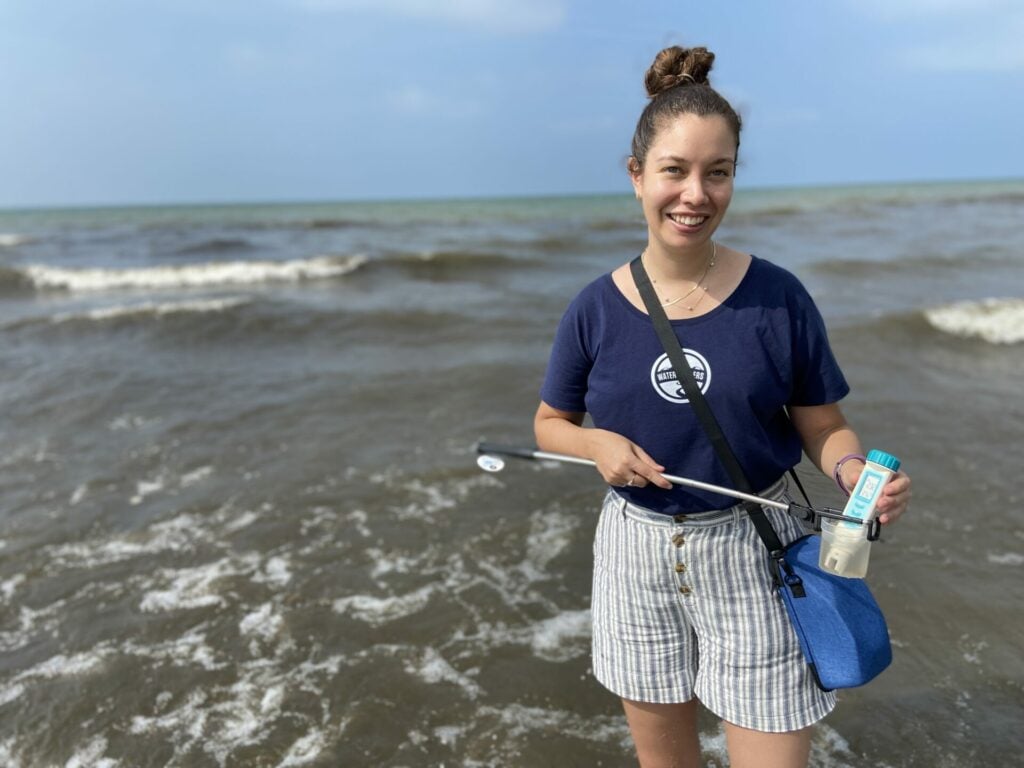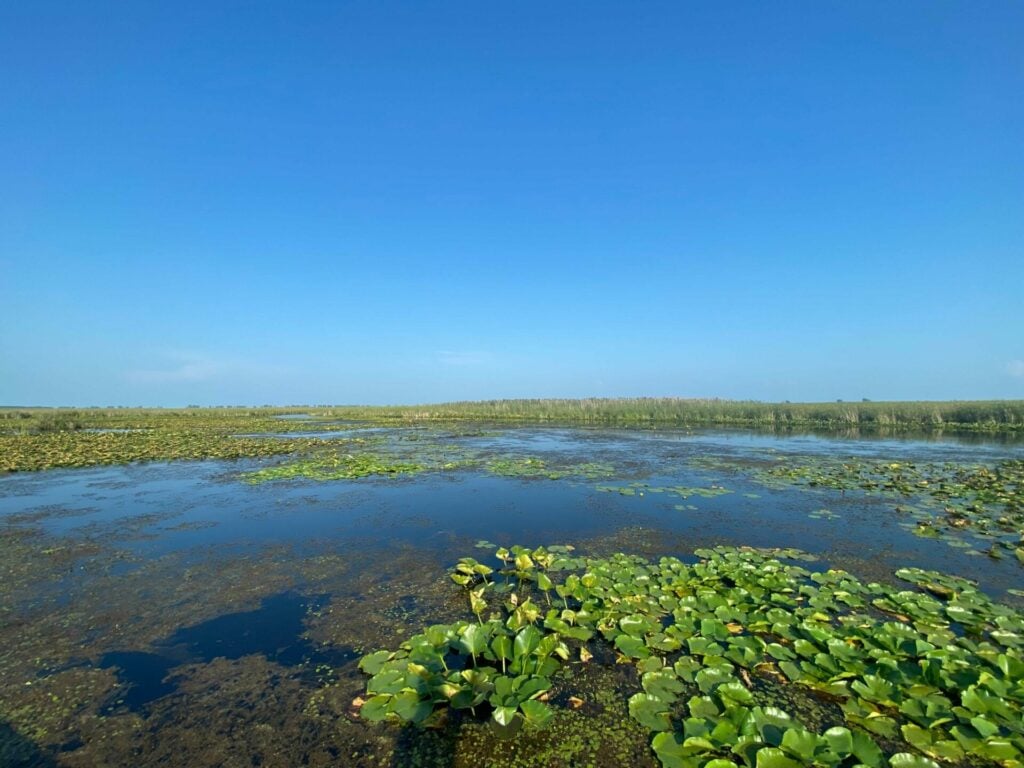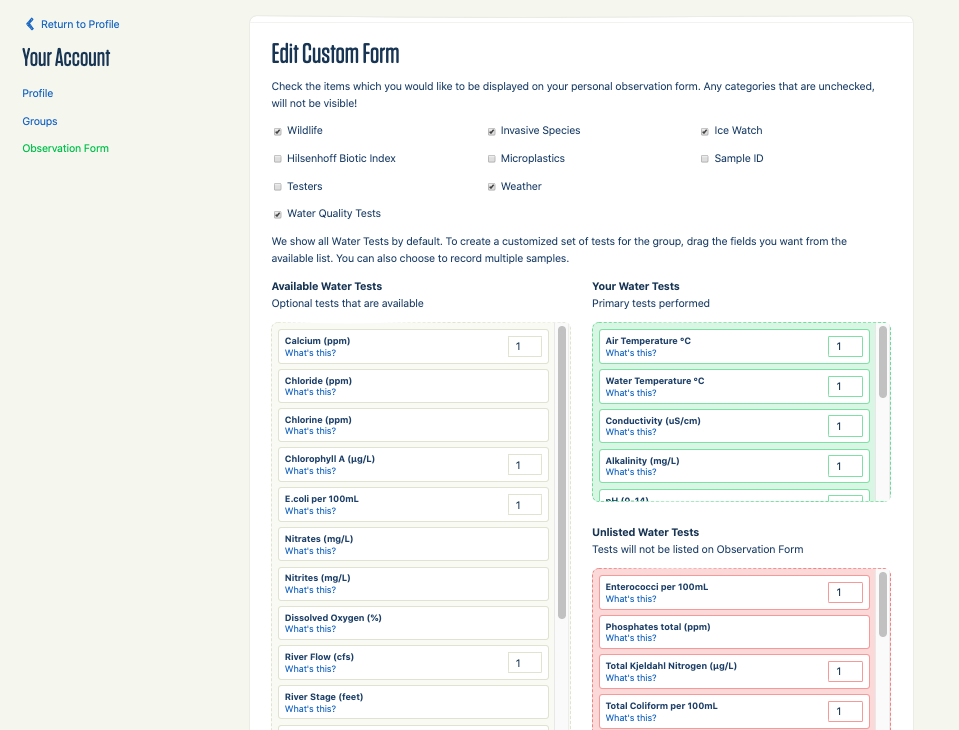Why water testing?
For us, water testing is important for two main reasons.

1. Testing leads to connection.
Let’s face it- modern society can be busy, complicated, and confusing. This is probably why, even though most Canadians say they care about water, many do not participate in its stewardship.
The solution? Testing with Water Rangers! Time and time again, we find that when people learn about and then test the water, they feel motivated to protect it. Now more than ever, we need more people to get involved with environmental stewardship, and testing is a great way to encourage this!
People often remark that testing:
- Encourages them to visit new beaches or lakes
- Helps them notice new things about their surroundings, such as pollution
- Leads to a greater appreciation for wildlife
- Prompts them to think about what else they can do to help
We’re so sure about the transformative power of testing because we see the fruit of it every day, but also because we conduct formal and informal research on it. Learn more about our research here.
Learn, test, act.
Our Theory of Change states that when people learn about, then test water, they are prompted to take action to protect it.
Learn more about the research that informs our Theory of Change here.

2. Water quality data is desperately needed.
Massive gaps in water quality data exist in Canada and beyond, which is extremely worrisome. After all, how can our leaders be expected to make good decisions for water if they don’t know how well it’s doing in the first place?
Unfortunately, there aren’t enough scientists and professionals on the ground who can consistently monitor all of the world’s water bodies. That’s where testers like you come in! We don’t aim to replace scientists, but we do want to lend a helping hand. By working together, we can accomplish so much more.
Starting in 2021, we’re also working on a data-sharing project with the Gordon Foundation’s DataStream. This project facilitates data sharing with an automated data exchange between our two platforms, with an initial focus on water data in the Great Lakes region.
In other words, when you add your data to Water Rangers, you’ll also have the option to share your data with DataStream. This will allow your data to reach even more people including scientists and decision-makers!
Find out if your area is data deficient.
We frequently consult WWF-Canada’s Watershed Reports to determine how the water in any given area is doing. We encourage you to check them out, too!
Data management FAQs
We have an API that you can connect to, and if your organization has software developers that can work with ours to customize our data platform, we can set up a meeting to see if we can make it work for you. We’re always open to collaborating and writing a grant application together to improve our data platform.
Oh no! We know how frustrating this can be, and we’re so sorry you’re experiencing this.
First, we recommend that you try deleting the app from your phone and re-installing it, and/or updating the app. When folks like you point out bugs to us, we try to fix them as soon as possible. These fixes might not show up while you’re still using an older version of the app, though!
If this doesn’t work, please take a screenshot of the issue you’re experiencing, and send it to us at [email protected]. If you could also tell us what kind of phone you’re using, what time the issue occurred at, and any other pertinent details, that would be great! We promise we’ll get back to you within 24 hours.
In the meantime, you can upload your data to our platform here.
If you have any other questions or concerns, please do not hesitate to contact us. Your feedback is greatly appreciated!
When you upload data to our platform, you are agreeing to our terms of service.
If you choose to share your data on our platform, you remain the owner of your data but choose to share it with others. It becomes open data that anyone can have access to or download. It’s like anything else on the internet- once you upload it, it’s out there! Since you’re the owner of it though, you can take it down or change it at any time. If you’re not sure how to do this, please contact us, and we’ll help you out.
You can definitely use our testkits without sharing your data online. That being said, if you receive equipment by participating in a study or from a grant, you should check with us before if you need to share your data or not. Sometimes it’s a condition of the grant that the data has to be shared online.
For more information, please see our data policy.
We believe that data should be open, meaning that anyone can have access to it. All the data you upload is available to anyone who views our platform. You can also download any data on the website as a CSV file. Some groups use our platform to share their data with their community and use it to write reports and papers. Our data is connected to regional data hubs to make sure it reaches more people. Scientists also reach out to us for data for their projects.
You don’t have to use our testkits to use our data platform. If you have your own testing equipment and want to upload your data, you can start a Group on our data platform and upload your data easily. For more information on how to add data and customize the forms to include all the parameters you test for, read this.
You sure can! If you’re testing more than what’s in our testkit and want to make that part of your observation form on your phone or on our web platform, you can add sections.
All you need to do is log in to the platform on your desktop and click on “Your Profile”. Then go to “Edit Your Account” on the left hand side below your name.

Select “Observation Form” from the menu on the left hand side and you’ll see different options of parameters and tests that you can add to your observation form. If you can’t find something that you’re looking for, reach out to us to see how we can help!

Our data is available to download in two ways:
- Anyone logged in can go to a sample location and download the data. It’s free to get an account.
- Group administrators can download all data from their group (including specifying the date range). This is found in “Managing Group” area.
Go to your observation, scroll down and click on “View Location Summary” on bottom left. Then scroll down the page and click on “Edit Location details” on the bottom left. This will take you to the form where you can adjust your location marker.
Education FAQs
We have some helpful information for teachers here. We have also just launched our new Education Testkit, which was made with teachers and junior/intermediate classrooms in mind. If you’d like to know more, contact us!
We love talking to kids about the work that Water Rangers does and how they can use our testkits! We’re actively looking for teachers to help us test and develop a curriculum around water testing with Water Rangers. If you’re interested in participating, please contact us.
If you want us to come give a presentation, contact us. Keep in mind that although we have testers from all across North America and beyond, we are physically located in the Ottawa and Montreal regions, and we ask that our mileage be covered.
We have been using our Testkits with groups of students since 2018. As such, we are always adapting them to suit students’ needs!
We recommend you use our Education testkit with your students. we have specifically designed the kit with schools and classrooms in mind. The kit can be used easily by 15-20 students of all ages.
Our Freshwater explorer testkit is best used between 4-5 junior/intermediate students, and is great for any body of water.
The Compact freshwater testkit is intended for smaller groups of 2-4 students, and is best for rivers, streams and ponds.
The Tiny testkit is great for 1-2 younger students, and can be used anywhere with easy access to a shoreline!
Group FAQs
The administrator of your group has the power change observations from other members. It’s a great way to do quality assurance of your own data. If you are the administrator of a group, you should see the option to edit an observation at the bottom left. Here’s how:
You certainly can! You can learn all about creating a group here. It’s a great way to let people know your testing protocol and manage different testers in your group.
The group administrator has a lot of privileges. They can:
- Create a testing region to let people know where you’re testing the water.
- Invite users to be part of your group.
- Download the data for all your group.
- Edit any observations from other members in the group if you find a mistake.
Parameter FAQs
Check out out parameters page for an in depth description and protocol to our testing parameters!
Water Rangers conductivity meters measure the conductivity of freshwater in µS, or microsiemens.
Water will measure different results of conductivity depending on it’s condition, shown below;
| Distilled water | 0.5 – 3 µS |
| Melted snow | 2 – 42 µS |
| Has effects on fish reproduction | over 500 µS |
| Tap water | 50 – 800 µS |
| Potable water | 30 – 1500 µS |
| Freshwater streams | 100 – 1,000 µS |
| Industrial wastewater | 10,000 µS |
| Sea water | 55,000 µS |
For more an introduction, our protocol, and additional information regarding conductivity, we encourage you to visit our conductivity parameter page!
Water Rangers measures dissolved oxygen, or DO2, in milligrams/litre.
Different measurements of DO2 will mean different circumstances for life in a water body, shown below;
- 0-2 mg/L: not enough oxygen to support life
- 2-4 mg/L: only a few fish and aquatic insects can survive
- 4-7 mg/L: good for many aquatic animals, low for cold water fish
- 7-11 mg/L: very good for most stream fish
For more an introduction, our protocol, and additional information regarding dissolved oxygen, we encourage you to visit our dissolved oxygen parameter page!
For optimal results, E.coli tests require an incubator. We don’t currently sell supplies that test for E.coli, but we may one day. Learn more about E.coli here.
If you’re looking for an E.coli test, we recommend TapScore.
Just like with phosphates, this is another parameter where the tests we’ve tried aren’t sensitive enough unless you’re in a pollution event. Probes we’ve seen don’t seem very sensitive, and experts we’ve worked with aren’t sure how accurate they are.
We encourage our testers to browse our affiliate Tap Score’s testing services, which include products for phosphates!
We are currently conducting research involving tests for high level phosphates, but have yet to find tests that we’re happy with. Field tests that are currently available on the market can you let you know if phosphates are present, but can’t tell you to what extent they are present. In other words, they’re not quite sensitive enough to be useful! Also, many of the field tests require you to handle reagents that can be toxic, and that makes disposal difficult, meaning they wouldn’t be safe for kids to use. We are watching this space closely, and working with partners to see if this can change.
While our kits are designed to test lakes, rivers, and oceans, parameters like lead, copper, calcium, and unwanted chemicals are critical for determining the overall safety of city water. We promote groups like Tap Score who have created easy-to-use monitoring kits for your home.
Tap Score has designed kits to test city water and well water, depending on the source of your water. They provide you everything you need to collect a sample and send it to them. Upon analyzing it, a water health report will be returned to you in only a matter of weeks!
If you’re looking to test the quality of freshwater, visit our store for the appropriate testing supplies!

To learn more, check out our parameters page on pH!
Partnership FAQs
That’s a great initiative! We’re always happy to partner with organizations, non-profits, schools, etc. to co-write a grant proposal to set up citizen monitoring programs. We’ve had good success in the past, but of course, we can’t guarantee anything. We’ve also prepared this fundraising toolkit to help groups think about how they want to set up their program.
We are always looking to partner with new or established organizations! We have launched a program that allows you to generate revenue for your organization while helping to grow the sustainable water monitoring movement. Take a look at our Ambassador Program to learn more!
Testkit FAQs
Yes! We offer a bulk discount of 5% off when you order 10 or more of our Freshwater Explorer testkits or Compact Freshwater testkits, and 10% off when you order 20 or more.
Every item in our testkits has been carefully researched. We’ve compared them to other available items on the market to make sure we have the most reliable and user friendly equipment. You can learn more about how we chose the different items in our testkit on our research page.
We are sorry about this inconvenience! We monitor our store as often as we can for any issues, but sometimes glitches and mistakes slip through the cracks. If you are having any problems purchasing kits or other supplies, please contact us and we will get back to you ASAP to fix the problem.
We’re glad to hear that you’ve been using up the supplies in your kit – that means that you are a super-tester! If you are looking for a re-stock, we have packs available here. If you need something that is not inside of this pack, check the store for other stand-alone products!
We sometimes have grants which can support sending out free items to testers. Contact us to find out more!
The answer depends on how often you use your kit! While our official schedule involves testing once per month, some of our testers decide to go out weekly. If you are going to test during our official testing weekends, the Freshwater and Compact kits will last well over a year. If you are going out to test more frequently, we recommend that you use some of the more expensive tests less often, such as the dissolved oxygen kit.
Using the website FAQs
We have many articles, information and activities on pages throughout our website! If you are having any trouble looking for something specific, send us a message in our chatbot and the bottom right of every page, or email us at [email protected].
Volunteering FAQs
Amazing! We always encourage people to start testing the water in what ever way is available to them! You can get one of our testkits or you can start gathering other data with equipment you have on hand. Your eyes are your best tool! You can go observe:
- The water and the shoreline
- Animals, plants, and fish you see
- Does the water level look low, normal or high?
- If you have a thermometer, you can easily measure the air and water temperature and record that as well.
You can also reach out to local environmental groups and see how they’re testing the water and ask if they need help.
That’s great! We’re always looking for more stories for our blog. You can contact us, make sure to tell us your story and we’ll be in touch! Other than sharing stories on our blog, we also like to feature stories on our social media accounts, so please send pictures, too!
We love partnering with knowledgeable people that have something to share with our community. Reach out to us and let’s discuss it more! We can work on making a short video explaining a certain water parameter that you test for together, or write something for our blog.